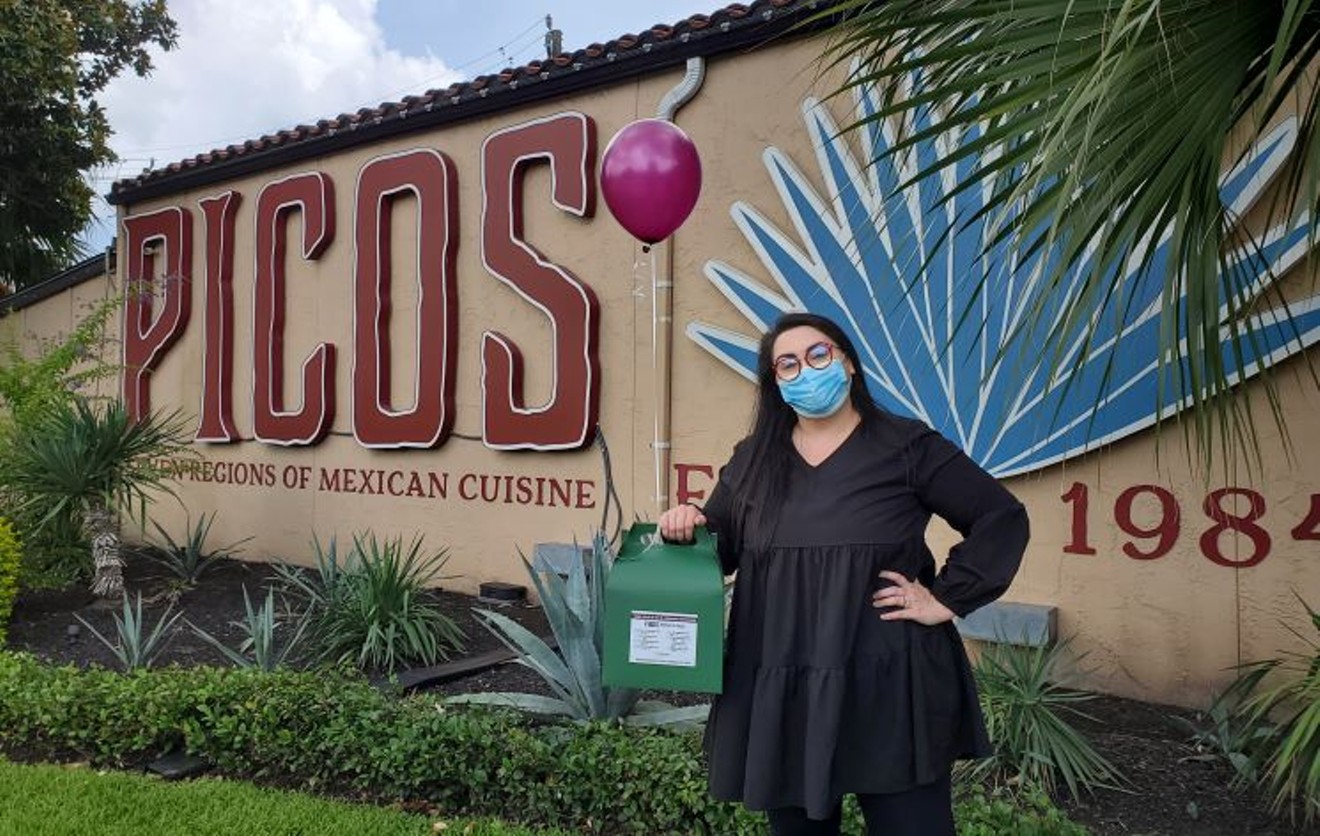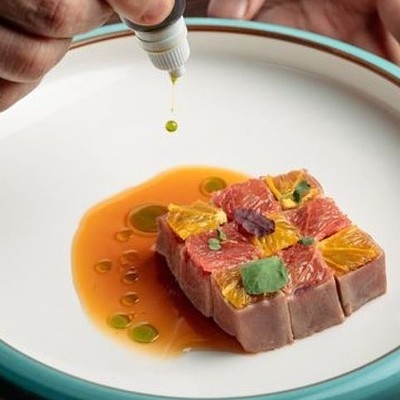As Marketing and Beverage Director for Arnaldo Richards' Picos Restaurant, the local Mexican food mainstay founded by her father, Arnaldo, Richards had been asked by plenty of patrons over the years if there was any way they could get signature cocktails like El Jefe Margaritas, Oaxacan Mules, and Mexican Sex on the Beaches along with their takeout orders.
Once Governor Greg Abbott issued an executive order back in March that expanded alcohol to-go sales as a temporary financial lifeline for restaurants forced to close their dining rooms amidst the pandemic, Richards and her team jumped into action. They ran with the new rules, devising ways to sell their most popular drinks both individually and in multi-drink mixing kits with delivery and takeout orders, which customers loved.
“They are joyous,” said Richards. “I can’t tell you how many messages I’ve received.”
In an April 28 tweet, Abbott confirmed that alcohol to-go in its current form could continue even after restaurants were allowed to re-open at limited capacity on May 1, along with a coy comment about his potential support for a more permanent enshrinement of these new rules. “From what I’ve heard from Texans, we may just let this keep on going forever,” he tweeted.
According to several players close to the state legislature and the Texas hospitality industry, getting this form of alcohol to-go codified into law after the current crisis has ended isn’t guaranteed by any means, but many share a cautious optimism that there’s a viable path forward.
This new normal for to-go alcohol orders isn’t a Wild West situation. For starters, alcohol can only be ordered for pickup with food, and only from establishments with permanent food service capabilities. Any booze sold to-go has to be in its manufacturer-sealed packaging, and liquor can only be sold in containers of 375 milliliters or less.
These rules prevent the sale of pre-mixed cocktails that contain liquor, like the frozen, fruity daiquiris sold to-go just 90 minutes east of Houston in Louisiana, often via drive-thru windows. These to-go cocktails are typically served with tape on the lid and a straw on the side to creatively comply with open container laws meant to discourage drunk driving, and have become a Louisianan institution in the nearly four decades since the first hard liquor daiquiri drive-thru opened in Lafayette in 1981.
Louisiana’s state Office of Alcohol and Tobacco Control doesn’t publish statistics about the size of the to-go daiquiri industry specifically, but it’s clearly booming — according to Google Maps data, the state is dotted with at least 170 different daiquiri shops. The ATC has specifically allowed Louisiana’s daiquiri businesses with drive-thru windows to remain open during the COVID-19 crisis.
This may make Louisiana seem like a nearby example Texans could point to in support of arguments for permanently expanded to-go alcohol sales. However, when it comes to restaurants and bars specifically, Louisiana’s current situation is actually even more restrictive than what’s in place in Texas right now. While Louisiana’s standalone daiquiri shops can serve their hard liquor cocktails to-go, their restaurants are only allowed to serve beer and wine to-go, and bars in the state aren’t allowed to serve any alcohol to-go at all.
The Texas Restaurant Association is one state advocacy group that supports the permanent expansion of alcohol to-go. According to a recent TRA policy brief, the COVID-19 pandemic has already led to the loss of approximately 700,000 Texas restaurant industry jobs and a $4.2 billion loss in revenue for the industry. Anna Tauzin, TRA’s Chief Revenue & Innovation Officer, said that input from TRA about how much Texas restaurants are struggling financially was part of what led Abbott to issue his waiver in the first place.
Tauzin said that TRA wasn’t shocked by the governor’s extension of the relaxed alcohol to-go rules past the May 1 restaurant reopening order, citing the responsible way that Texas dining establishments have handled the new to-go landscape. “We were extremely grateful, but not surprised,” she said. “It’s something restaurants have been doing very well, and frankly, responsibly.”
After having successfully lobbied for a law passed last year that allowed the limited delivery of beer and wine from restaurants by third party couriers, Tauzin said that TRA plans to push the Legislature to permanently legalize alcohol to-go sales with food during next year’s session.
Any lobbying effort to get these changes written into state law would benefit from the support of alcohol producers like Zamora Company USA, the Dallas-based stateside branch of the Spanish liquor distributor that owns Houston’s Yellow Rose whiskey distillery. “We would definitely support it if this continues,” said Matthew Appleby, Zamora Company USA’s director of marketing.
Appleby mentioned the potential revenue growth for brands like Yellow Rose that could come from new offerings like customized to-go cocktail mixing kits, as well as rumblings of support he’s heard from Texan alcohol producers, wholesalers, and retailers.
“I haven’t heard anybody who’s had a negative opinion of this new move,” Appleby said.

A to-go margarita order (non-alcoholic frozen mix with alcohol in manufacturer-sealed containers on the side) with food from Hopdoddy Burger Bar in Webster.
Photo by Schaefer Edwards
She also made clear that the TPSA believes expansion of alcohol to-go could have the unintended consequence of making it more difficult to prevent drunk driving and underage drinking.
“We do not support relaxing open container laws,” her statement cautioned, “and must do everything within our power to curb drinking and driving and prevent underage access to alcohol.”
If past attempts to get alcohol law reforms through the state legislature are any indication, advocates for expanded alcohol to-go sales from restaurants should be prepared to deal with some opposition.
State Representative Eddie Rodriguez, a Democrat from Austin, and Charles Vallhonrat, Executive Director of the Texas Craft Brewers Guild, were two of the main proponents in 2019’s 86th Legislature for legalizing the sale of beer to-go directly from Texas breweries. Both Rodriguez and Vallhonrat spoke to how difficult it can be to lobby the Legislature to enact new, relaxed laws about alcohol sales.
Language from a bill written by Rodriguez was eventually included as an amendment to the ultimately successful House Bill 1545, a larger bill that was passed in order to re-authorize the TABC to keep operating for the next 12 years.
“It was pretty hard to pass beer to-go, to be honest with you,” said Rodriguez. He referenced the opposition they faced early on in the process from some Texas beer distributors represented by the trade organization Wholesale Beer Distributors of Texas and from retailers represented by the TPSA, who each raised safety concerns about allowing breweries to sell beer directly to consumers outside of their respective tiers of the three-tier distribution system, the set of retail and regulatory checks and balances an alcoholic beverage typically goes through before it gets in the hands of a Texan.
The three-tier system dictates that alcohol producers like breweries, wineries, and liquor distilleries, the first tier in the system, must sell their products to alcohol wholesalers, the second tier. These wholesalers then act as distributors, selling alcohol to retailers, the system’s third tier, who then sell the booze to consumers. Unlike other retailers, restaurants in Texas are required to jump through another hoop to acquire some types of alcohol—restaurants are only allowed to buy wine and hard liquor from “package stores,” another name for retail liquor stores like Spec’s and Total Wine.
Each rung of the three-tier ladder involves various licensing requirements and taxes that provide funding for public health and safety initiatives. Proponents of the three-tier system like the Wholesale Beer Distributors of Texas and the TPSA also claim that the multiple layers create more checkpoints and safeguards to prevent tainted, potentially harmful products from getting out into the market, and to stop any alcohol from getting into the hands of minors. Aside from these safety concerns, though, it’s also undeniable that these groups have a financial interest in opposing any change in the state’s regulatory structure that would bypass the alcohol distribution tiers they represent.
Vallhonrat cautioned alcohol to-go supporters that it wouldn’t be easy to get the current set of rules written into state law based on his experience with the drawn-out beer to-go battle, which played out in starts and stops between 2013 and 2019.
“There’s a lot involved in the political process to get something to become law versus an emergency order,” Vallhonrat said. His main advice for those who hope to change the laws around alcohol sales to-go from restaurants is to stick to a focused, clear message.
“It’s a marketing campaign as much as it is a political campaign,” he explained.
Alba Huerta, owner of the award-winning Houston cocktail bar Julep, believes that any campaign to expand alcohol to-go sales long-term should be inclusive to all members of the Texas food and beverage industry, including bars. Texas bars were not included in the first phase of state-approved reopenings on May 1, and have only been given permission to open for full service at 25 percent capacity as of May 22. Additionally, many bars have been unable to take advantage of to-go beverage sales due to their lack of permanent food service infrastructure.
Huerta hopes to see a long-term solution enacted that would go further than the current rules in place by allowing cocktails with the liquor already mixed in to be sold to-go under a responsible regulatory structure.
A big reason she and other industry figures support such a move is because pre-mixed cocktails can be made with liquor that is bought in bulk in larger bottles, while the current rules only allow for unmixed drinks with liquor on the side in small, sealed bottles that are more expensive by volume. This means that under current rules, the same drink with the same amount of alcohol in it is more expensive to make than if it were made with bulk liquor, which cuts into bar and restaurant profit margins.
“I think it’s important to not lose the value of what a cocktail is,” Huerta said, describing how bars would also be unfairly deprived of their ability to provide to customers the added-value of their highly-skilled bartenders in a world without pre-mixed cocktails to-go. “We know how to make these drinks,” Huerta continued, “and that’s why they’re so special...would you ask restaurants to not cook any of their food and pre-sell it to people in that same packaging?”
Not all local restaurateurs agree that pushing for pre-mixed cocktails to-go is worth the trouble. “I don’t know if I trust pre-mixed beverages,” said Picos’s Monica Richards. “How can you gauge liability and fault if someone goes and does something with a pre-mixed drink and you’re not able to truly gauge how much alcohol was actually in that drink?”
“For me,” she continued, “having it be legal and viable, it’s better this way. It might cost me a little bit more money, but I’m getting to sell drinks to-go.”
Tauzin and her Texas Restaurant Association colleagues are optimistic about their upcoming push for an expanded, long-term framework for alcohol to-go during next year’s legislative session. In addition to making the crisis-inspired expansion permanent, TRA also supports legalizing the sale of pre-mixed cocktails to-go with food in a safe, regulated fashion, even though that might be a harder sell than extending the currently approved structure.
On the topic of doing away with the pre-sealed, limited-size liquor container requirements that currently prevent the sale of pre-mixed cocktails to-go, Texas Package Stores Association spokeswoman Jennifer Stevens once again raised the specter of drunk driving and underage alcohol abuse.
“Our association does not support the relaxation of measures that will increase drinking and driving or make alcohol easily accessible to underage children,” her statement concluded.
Tauzin hopes that state lawmakers considering legislation around alcohol to-go will try to embrace a classically Texan, entrepreneurial cowboy spirit, “and think about what’s possible versus what might offend people.”







